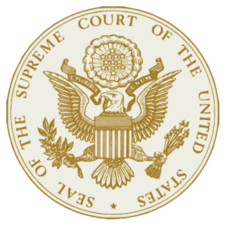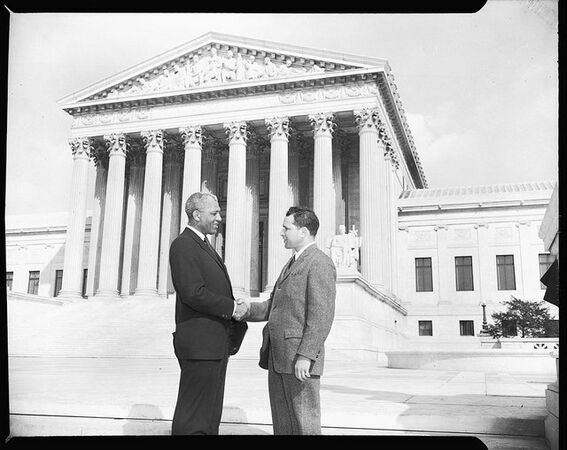Help us improve in just 2 minutes—share your thoughts in our reader survey.
Flowers v. Mississippi
 | |
| Flowers v. Mississippi | |
| Term: 2018 | |
| Important Dates | |
| Argument: March 20, 2019 Decided: June 21, 2019 | |
| Outcome | |
| Reversed and remanded | |
| Vote | |
| 7-2 | |
| Majority | |
| Chief Justice John G. Roberts • Ruth Bader Ginsburg • Stephen Breyer • Samuel Alito • Sonia Sotomayor • Elena Kagan • Brett Kavanaugh | |
| Dissenting | |
| Clarence Thomas • Neil Gorsuch | |
Flowers v. Mississippi is a case argued before the Supreme Court of the United States on March 20, 2019, during the court's 2018-2019 term. It came on a writ of certiorari to the Supreme Court of Mississippi.[1]
The case concerned racial discrimination in jury selection. In a 7-2 opinion on June 21, 2019, the U.S. Supreme Court reversed the judgment of the Supreme Court of Mississippi and remanded the case. Justice Brett Kavanaugh wrote the majority opinion. Justice Samuel Alito filed a concurring opinion. Justice Clarence Thomas dissented, joined by Justice Neil Gorsuch.[2] Click here for more information about the opinion.
You can review the lower court's opinion here.[4]
Timeline
The following timeline details key events in this case:
- June 21, 2019: U.S. Supreme Court reversed the judgment of the Supreme Court of Mississippi and remanded the case.
- March 20, 2019: Oral argument
- November 2, 2018: U.S. Supreme Court agreed to hear the case
- June 22, 2018: Petition filed with U.S. Supreme Court
- November 2, 2017: Supreme Court of Mississippi reinstated and affirmed Flowers' convictions and death sentence
Background
Curtis Flowers was sentenced to death for a quadruple murder in Winona, Mississippi, in 1996. He was tried six times for the crime.[5]
During the first four trials, prosecutor Doug Evans removed potential black jurors from hearing the case and was twice found to have violated Batson v. Kentucky, which bans racial discrimination in selecting jurors. Flowers’ fifth trial deadlocked. During the sixth trial, Evans accepted one black juror and rejected five potential black jurors. Flowers then challenged Evans' rejection of the black jurors, but the Mississippi Supreme Court rejected his challenge.[3]
The U.S. Supreme Court then ordered the Mississippi Supreme Court to reconsider the ruling "in light of the Supreme Court’s 2016 decision in Foster v. Chatman, in which the court held that the defendant in a capital case had shown intentional discrimination in the selection of jurors," according to SCOTUSblog.[5]
The Mississippi Supreme Court upheld its original ruling, holding that "after review and further consideration in light of Foster, we discern no Batson violation and reinstate and affirm Flowers' convictions and death sentence." Flowers appealed to the Supreme Court, and the court agreed to hear the case on November 2, 2018.[4]
Question presented
The petitioner presented the following question to the court:[3]
Question presented:
|
Outcome
In a 7-2 opinion on June 21, 2019, the U.S. Supreme Court reversed the judgment of the Supreme Court of Mississippi and remanded the case. The court held that the trial court at Flowers' sixth trial was wrong to conclude the State's peremptory strike of a black prospective juror was not racially motivated.[2]
Justice Kavanaugh wrote the majority opinion. Justice Alito filed a concurring opinion. Justice Thomas dissented, joined by Justice Gorsuch as to parts I, II, and III.[2]
Opinion
In his opinion, Justice Kavanaugh wrote:[6]
| “ | All of the relevant facts and circumstances taken together establish that the trial court committed clear error in concluding that the State’s peremptory strike of black prospective juror Carolyn Wright was not 'motivated in substantial part by discriminatory intent.' ...
|
” |
Concurring opinion
Justice Alito filed a concurring opinion.
In his concurring opinion, Justice Alito wrote:[2]
| “ | Were it not for the unique combinations of circumstances present here, I would have no trouble affirming the decision of the Supreme Court of Mississippi, which conscientiously applied the legal standards applicable in less unusual cases. But viewing the totality of the circumstances present here, I agree with the Court that petitioner’s capital conviction cannot stand. [7] | ” |
Dissenting opinion
Justice Thomas filed a dissenting opinion, joined by Justice Gorsuch as to parts I, II, and III.[2]
In his dissent, Justice Thomas wrote:[2]
| “ | The Court today does not dispute that the evidence was sufficient to convict Flowers or that he was tried by an impartial jury. Instead, the Court vacates Flowers’ convictions on the ground that the state courts clearly erred in finding that the State did not discriminate based on race when it struck Carolyn Wright from the jury.
|
” |
Text of the opinion
Read the full opinion here.
Audio
- Audio of oral argument:[8]
Transcript
- Transcript of oral argument:[9]
See also
External links
- U.S. Supreme Court docket file - Flowers v. Mississippi (petitions, motions, briefs, opinions, and attorneys)
- SCOTUSblog case file for Flowers v. Mississippi
Footnotes
- ↑ Supreme Court of the United States, "17-9572 Flowers v. Mississippi," accessed February 22, 2019
- ↑ 2.0 2.1 2.2 2.3 2.4 2.5 2.6 Supreme Court of the United States, Flowers v. Mississippi, decided June 21, 2019
- ↑ 3.0 3.1 3.2 Supreme Court of the United States, "17-9572 Flowers v. Mississippi," accessed February 22, 2019
- ↑ 4.0 4.1 SCOTUSblog, "Flowers v. Mississippi," accessed February 22, 2019
- ↑ 5.0 5.1 SCOTUSblog, "Busy afternoon at the Supreme Court: Six grants and one reargument order, but no stay in census dispute," November 2, 2018
- ↑ Cite error: Invalid
<ref>tag; no text was provided for refs namedREF - ↑ 7.0 7.1 7.2 Note: This text is quoted verbatim from the original source. Any inconsistencies are attributable to the original source.
- ↑ Supreme Court of the United States, Flowers v. Mississippi, argued March 20, 2019
- ↑ Supreme Court of the United States, Flowers v. Mississippi, argued March 20, 2019












